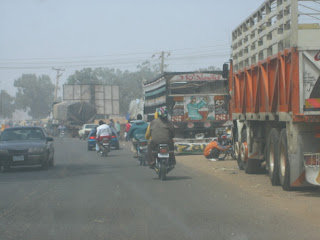

 Coming home from church in the southern part of Jos one Sunday we took a series of photos of the main avenues and streets connecting the south with the northern part of the city where we live. These photos were taken from the car window; we are coming down from a high point in the city, somewhat south and east of the centre. Usually we can see much of the centre of Jos from here.
Coming home from church in the southern part of Jos one Sunday we took a series of photos of the main avenues and streets connecting the south with the northern part of the city where we live. These photos were taken from the car window; we are coming down from a high point in the city, somewhat south and east of the centre. Usually we can see much of the centre of Jos from here.


 We are approaching the junction where the road leading north out of Jos meets the ring-road to the east, a major artery that will take us past the 'permanent site' for Unijos. As you may notice, even on this cold and windy Sunday there is lots of traffic and business going on near the junction. The numerous motorcycles and also pedestrians occupying the road alongside vehicles, large and small, mean that this stretch of road is not easy for drivers to negotiate; in fact it is one of our least favorite stretches, though there is no alternative route to our destination.
We are approaching the junction where the road leading north out of Jos meets the ring-road to the east, a major artery that will take us past the 'permanent site' for Unijos. As you may notice, even on this cold and windy Sunday there is lots of traffic and business going on near the junction. The numerous motorcycles and also pedestrians occupying the road alongside vehicles, large and small, mean that this stretch of road is not easy for drivers to negotiate; in fact it is one of our least favorite stretches, though there is no alternative route to our destination.


 We are getting closer to Unijos; you will note that the fields here are open. The university was given many acres of land, previously used in tin mining; these fields are pitted where the surface was denuded of minerals. But until the university finds a way of using the land for its 'permanent' campus many farmers still rent or lease the land, to grow vegetables.
We are getting closer to Unijos; you will note that the fields here are open. The university was given many acres of land, previously used in tin mining; these fields are pitted where the surface was denuded of minerals. But until the university finds a way of using the land for its 'permanent' campus many farmers still rent or lease the land, to grow vegetables.


No comments:
Post a Comment